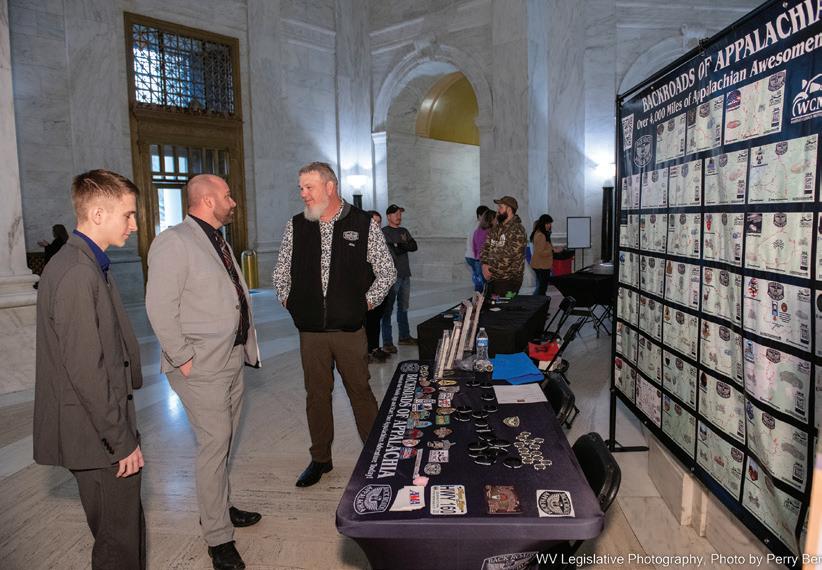
6 minute read
LOBBYING
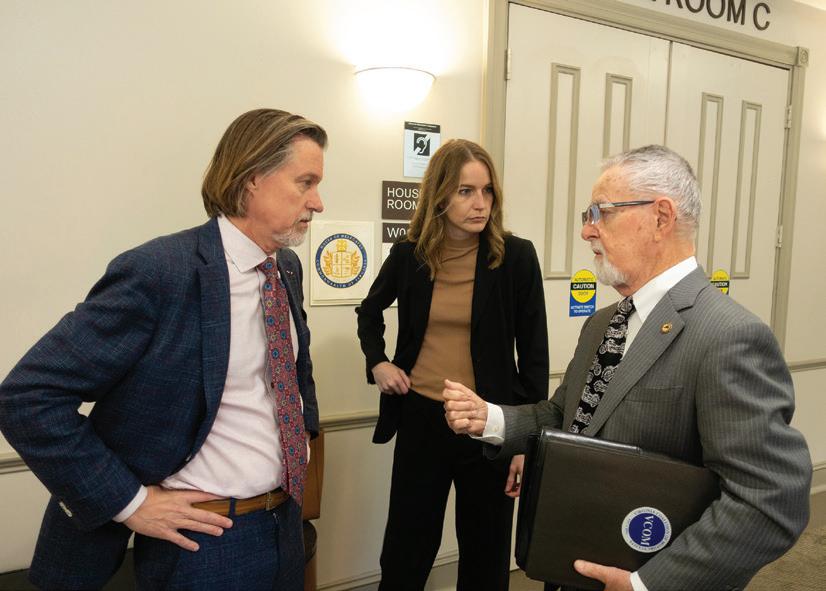
Learn how to use your as an power
Member To Effect Legislative Change




Coordinator Erin Reda made the trip, joining Matt Danielson, the primary lobbyist for the Virginia Coalition of Motorcyclists. Together they met with key members of the legislature to support and oppose a variety of bills introduced for the 2023 legislative session.
A couple weeks later, Tiffany traveled with AMA Government Relations Off-Highway Manager Pete Stockus to West Virginia’s lobbying day. Between the three of them, the team has generated some tips for AMA members on what this type of lobbying looks like and how you can dive into your own adventure into advocacy for motorcycling.
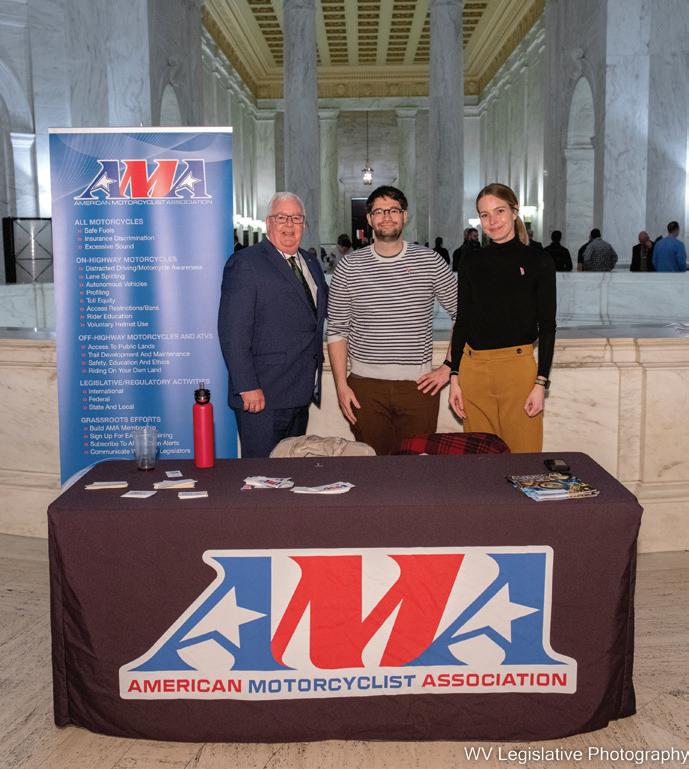
LOBBYING — NOT WHAT YOU THINK
What is lobbying? For most, the word has a negative connotation, one borne from the idea of some special interest group wielding undue influence over the legislative process, usually with plenty of money involved. But lobbying is essentially advocacy, referring to the action of individuals or groups meeting with their elected officials to advocate on behalf of issues that really matter to them.
You Can Have An Impact
Don’t dismiss the idea of lobbying because you don’t think you can have an impact as an average citizen…not true! Our staff has witnessed time and time again how a few citizens or a large group of them — taking time to speak with the elected officials who represent them can be more powerful than many professional lobbyists.
“This is true for one reason,” Tiffany said. “You can vote for these officials. You live in their district, and just by showing up in their office you’ve shown how important this issue is to you. Of course, that impact is lessened a bit the further you go up the food chain. U.S. Senators will listen to your concerns, but your local officials just might be your neighbor or have kids in the same school you do. Just like most people, they want their neighbors to like them…and more importantly, vote for them.”
Remember, meeting with state and local officials probably isn’t as intimidating as you might think. Your state and local officials aren’t cloistered away in an ivory tower of government — they’re usually just average people who have average jobs in addition to serving as elected officials.
Schedule A Meeting
In some cases, as with Virginia’s unofficial lobby day, you can get access to decision-makers without making appointments. Tiffany and Erin were able to get penciled in for quick chats within a couple of hours, but it’s not always that easy.
When you plan to go meet your elected officials, it’s best to schedule a meeting. In most cases, you can find the contact information for the official you want to meet with online. While you can schedule a meeting at their office at the capital (in the case of state officials), district offices or informal events offer an excellent opportunity to connect in a less-formal setting. Informal events to connect with constituents are generally advertised on the official’s website or social media.
*Insider Tip: It’s always a great idea to follow your local elected officials on social media channels.
A few basics to remember as you work to get a face-to-face meeting on the schedule include:
• Be polite. You’ll probably be talking to a staffer first, as they receive a lot of calls from people who want their boss’ time. Politeness often makes a difference on whether you’ll get any farther in the process.
• Be prepared. Let the staffer know what you want to talk about (often a bill you want to support or oppose).
• Check in. The day before your meeting, email the staffer to confirm. Schedules change all the time for elected officials, so checking in is a good habit.
Preparation Is Key
Now that you have a meeting, don’t waste it by going in unprepared. Develop a presentation that does as much of the work for the legislator as possible. And make sure you’re well informed on the issue you’ll be meeting about.
“If you’re meeting about a specific bill or you want the legislator to introduce a bill or make an amendment to another, bring some suggested language,” Tiffany recommends. “Our AMA Government Relations staff is happy to help you with this, too. Email and we’ll help you prepare.”
“It’s a good idea to have a simple one-page sheet of bullet points to keep you on track in your meeting,” she continued, “and that opens the door for follow-up after the meeting to provide additional information. Remember, you’re likely one of a dozen meetings that day about wildly different issues, so the more work you do for the legislator, the easier it is for them to work with you.”
In addition, take time to learn a thing or two about your legislator. Check the biography section on their website. You might find out that they worked in law enforcement before being elected, or that you attended the same high school. “Having something in common helps break the ice when you sit down with a legislator,” Tiffany says, “and knowing their background can also help you frame your issue in your meeting.” remember when your issue is brought up. You just might be the only meeting they had where someone wasn’t yelling at them.
Follow Up
As Erin experienced a lobbying day for the first time, watching the pros at work left her with a few observations. “The two most common phrases I heard from legislators through the day were, ‘I didn’t think of it from that perspective’ and ‘let’s see what we can do.’ Tiffany and Matt explained that you don’t go into a meeting expecting immediate results. You probably won’t get a legislator to commit 100 percent to what you’re asking them to do. That really drove home how important follow up can be. After making your case, you need to remind them that you want to see them follow through.”
Even if your meeting didn’t go well, all is not lost. You shouldn’t let that get in the way of developing a friendly relationship with the official. They’re likely to agree with you on another issue or may come around to your way of thinking in the future.
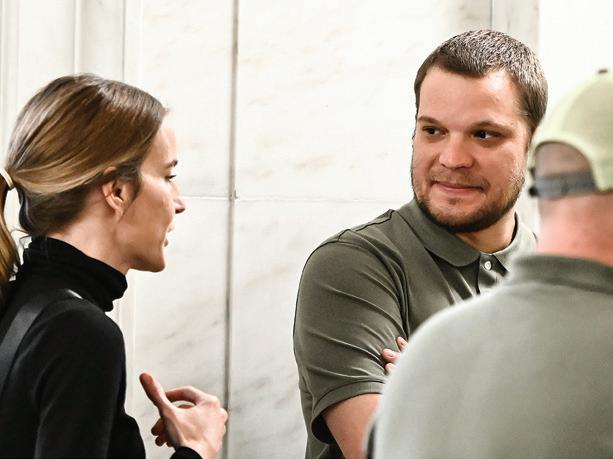
The Presentation
Start your meeting on the right foot by arriving a few minutes early. That means planning for plenty of time to park, find the office, and get settled before your meeting. When it’s time to sit down with the legislator or staff member, introduce yourself, be polite, and feel free to break the ice with a little small talk. But it’s important to present your business quickly since you likely only have 5-10 minutes for your meeting.
Here’s a good, basic structure to follow for your presentation:
• Introductions – Who are you? Are you representing yourself or a group?
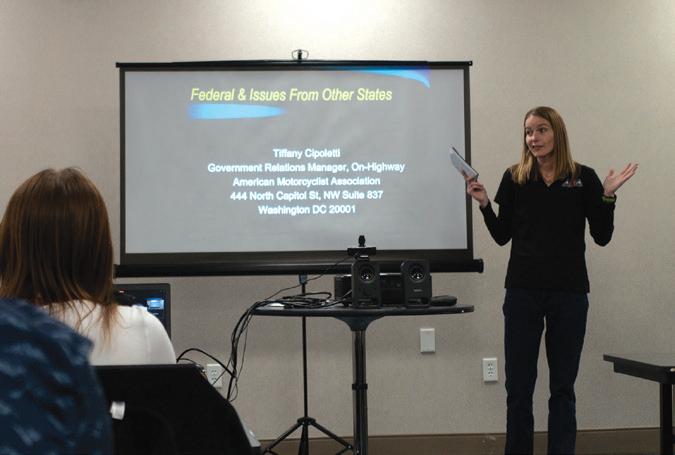
• Background – Give the basic background on the issue you’re addressing. For example, if you’re trying to get a dead-red law passed (traffic-controlled stop lights that don’t detect motorcycles and leave them stranded), explain the problem — and propose a solution.

• The Specifics – If you’re there to support or oppose a specific bill, mention that up front.
• Stick to the Issue – Avoid getting off topic.
• Ask for Questions – Even if you don’t immediately have an answer, you can always follow up via email.
• Say Thanks! – Leaving them with a good impression by saying thank you for their time can make an impact they
“This is where it’s important to stay polite when engaging with your officials,” Tiffany said. “It’s possible to ruin relationships with powerful officials over disagreements if not handled professionally, while staying respectful and courteous leaves the door open to find common ground on another issue. Advocacy is a marathon, not a sprint.”
Erin found the ease of interaction and genuine enthusiasm legislators had to speak with their constituents impressive. “As important as it is for citizens to bring their opinions to the table, it’s just as critical for legislators to get facetime in with their constituents to feel the pulse of their issues,” she said. “It was great to see the natural give and take of the democratic process happen within the halls of the state capitol, furthering the truth that politics is by and for the people.”
Your voice matters, and the AMA works to make interactions with elected officials as accessible as possible to our members. Our Government Relations team is standing by, ready to connect you with your representatives and help you bring motorcyclist issues to the table with your local government officials.
Don’t know who represents you? The AMA’s action center at AmericanMotorcyclist.com/action-center has a “find officials” tool. Plug in your address to find your state and federal officials. For additional assistance, email us at grassroots@ama-cycle.org. AMA










